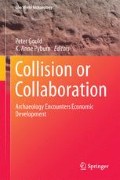Abstract
This chapter illustrates the importance of incorporating local perceptions of heritage. It addresses governance structures of heritage and the political economies that give rise to them. It stems from a growing dissatisfaction with the ever more dysfunctional and socially and economically unfair character that heritage management has adopted in Spain since the start of a devastating economic crisis in 2008. The aim of our exploratory inquiry is to prompt a necessary debate about new potential forms of heritage governance in Spain that could have broader implications elsewhere in heritage management. To do so, we first situate recent conceptualizations of heritage in the current postindustrial economic context. We draw inspiration from the theory of cognitive capitalism, which argues that the modern economy has superseded the classical differentiation between economic wealth derived from labor processes on one side and physical capital on the other. Cognitive capitalism holds that the wealth created today derives from information technology and knowledge that are the products of human imagination and networks of interaction among people and objects. Such “immaterial wealth” is inherently difficult to value quantitatively or to restrict for proprietary use. As a result, wealth created is realized through mechanisms such as patents or other means to protect intellectual property, with the beneficiaries of that wealth determined by prevailing systems of political economy.
Access this chapter
Tax calculation will be finalised at checkout
Purchases are for personal use only
References
Alonso Gonzalez, P. (2014). From a given to a construct: Heritage as a commons. Cultural Studies, 28(3), 359–390.
Alonso González, P. (2014). The heritage machine: The neoliberal order and the individualisation of identity in Maragatería (Spain). Identities: Global Studies in Culture and Power, 22(4), 397–415.
Alonso González, P., & Fernández Fernández, J. (2013). Rural development and heritage commons management in Asturias (Spain): The ecomuseum of Santo Adriano. Journal of Settlements and Spatial Planning, 2, 245–253.
Alonso González, P., & Macías Vázquez, A. (2014a). Bombardeando patrimonio en el Campo de Tiro Militar de El Teleno (León): De la sublimación de la naturaleza a la construcción social del patrimonio cultural. Arbor, 190(766), a121.
Alonso González, P., & Macías Vázquez, A. (2014b). Neoliberalismo corporativo y clientelismo en España: Etnografía de la financiación europea del desarrollo rural a través de un proyecto fallido. AIBR, 9(3), 223–250.
Álvarez Solís, C. (2000). Modelo de desarrollo turístico de un área rural en declive. Observatorio Medioambiental, 3, 419–435.
Ashworth, G. J., Graham, B., & Tunbridge, J. (2000). A geography of heritage: Power, culture, and economy. London, New York: Arnold, Oxford University Press.
Benito Del Pozo, P., & Alonso González, P. (2012). Industrial heritage and place identity in Spain: From monuments to landscapes. Geographical Review, 102(4), 446–464.
Bourdieu, P. (1984). Distinction: A social critique of the judgement of taste. Cambridge, MA: Harvard University Press.
Corsani, A., & Rullani, E. (2000). Production de connaissance et valeur dans le postfordisme. Multitudes, 2, 97–110.
Davis, P. (2010). Ecomuseums: A sense of place. London: Continuum.
De Angelis, M. (2003). Reflections on alternatives, commons and communities. The Commoner, 6, 1–14.
Fennell, L. A. (2011). Ostrom’s law: Property rights in the commons. International Journal of the Commons, 5(1), 9–27.
Fernández Mier, M., Fernández, J. F., Alonso González, P., Antonio López Sáez, J., Pérez Díaz, S., & Hernández Beloqui, B. (2014). The investigation of currently inhabited villages of medieval origin: Agrarian archaeology in Asturias (Spain). Quaternary International, 346, 41–55.
Hanlon, G. (2014). The entrepreneurial function and the capture of value: Using Kirzner to understand contemporary capitalism. Ephemera: Theory and Politics in Organization, 14(2), 177–195.
Hardt, M., & Negri, A. (2009). Commonwealth. Cambridge: Harvard University Press.
Harvey, D. (2002). The art of rent: Globalization, monopoly and the commodification of culture. Socialist Register, 38, 93–110.
Hess, C. (2008). Mapping the new commons. Governing shared resources: Connecting local experience to global challenges; 12th Biennial Conference of the International Association for the Study of the Commons, University of Gloucestershire, Cheltenham, July 14–18, 2008.
Kleiner, D. (2007). Copyfarleft and Copyjustright. Mute. Retrieved May 21, 2016, from www.metamute.org/en/Copyfarleft-and-Copyjustright.
Kopytoff, I. (1986). The cultural biography of things: Commoditization as process. In A. Appadurai (Ed.), The social life of things: Commodities in cultural perspective (pp. 64–91). New York: Cambridge University Press.
Macías Vazquez, A., & Alonso Gonzalez, P. (2016). Knowledge economy and the commons: A theoretical and political approach to post-neoliberal common governance. Review of Radical Political Economics, 48(1), 140–157.
Madison, M. J., Frischmann, B. M., & Strandburg, K. J. (2010). Constructing commons in the cultural environment. University of Pittsburgh Legal Studies Research Paper No. 2008-26. Cornell Law Review, 95, 657–710.
Pasquinelli, M. (2008). Animal spirits: A bestiary of the commons. New York: NAi.
Vercellone, C. (2008). The new articulation of wages, rent and profit in cognitive capitalism. In The art of rent. London: Queen Mary University.
Author information
Authors and Affiliations
Corresponding author
Editor information
Editors and Affiliations
Rights and permissions
Copyright information
© 2017 Springer International Publishing Switzerland
About this chapter
Cite this chapter
González, P.A., Vázquez, A.M., Fernández, J.F. (2017). Governance Structures for the Heritage Commons: La Ponte-Ecomuséu-Ecomuseum of Santo Adriano, Spain. In: Gould, P., Pyburn, K. (eds) Collision or Collaboration. One World Archaeology. Springer, Cham. https://doi.org/10.1007/978-3-319-44515-1_11
Download citation
DOI: https://doi.org/10.1007/978-3-319-44515-1_11
Published:
Publisher Name: Springer, Cham
Print ISBN: 978-3-319-44514-4
Online ISBN: 978-3-319-44515-1
eBook Packages: Social SciencesSocial Sciences (R0)

